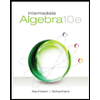
Concept explainers
Exercises 1-3 refer to the grammar with start symbol sentence, set of terminals T = {the, sleepy, happy, tortoise, hare, passes, runs, quickly, slowly}, set of non-terminals N = {noun phrase, transitive verb phrase, intransitive verb phrase, article, adjective, noun, verb, adverb), and productions:
sentence ? noun phrase transitive verb phrase noun phrase sentence ? noun phrase intransitive verb phrase noun phrase ? article adjective noun noun phrase ? article noun transitive verb phrase ? transitive verb intransitive verb phrase ? intransitive verb adverb intransitive verb phrase ? intransitive verb
article ? the
adjective ? sleepy
adjective ? happy
noun ? tortoise
noun ? hare
transitive verb ? passes
intransitive verb ? runs
adverb ? quickly
adverb ? slowly
1. Use the set of productions to show that each of these sentences is a valid sentence.
a) the happy hare runs
b) the sleepy tortoise runs quickly
c) the tortoise passes the hare
d) the sleepy hare passes the happy tortoise
Want to see the full answer?
Check out a sample textbook solution
Chapter 13 Solutions
Discrete Mathematics and Its Applications ( 8th International Edition ) ISBN:9781260091991
- 7. 11 m 12.7 m 14 m S V=B₁+ B2(h) 9.5 m 16 m h+s 2 na 62-19 = 37 +, M h² = Bu-29arrow_forwardFind the interval and radius of convergence for the given power series. n=0 (− 1)" xn 7" (n² + 2) The series is convergent on the interval: The radius of convergence is R =arrow_forwardFind the interval and radius of convergence for the given power series. n=1 (x-4)" n( - 8)" The series is convergent on the interval: The radius of convergence is R =arrow_forward
- Find the interval and radius of convergence for the given power series. n=0 10"x" 7(n!) The series is convergent on the interval: The radius of convergence is R =arrow_forwardwhat would a of a interscribed angle be with an arc of 93 degrees and inside abgles of 111 and 98arrow_forwardFrom a sample of 26 graduate students, the mean number of months of work experience prior to entering an MBA program was 34.67. The national standard deviation is known to be18 months. What is a 90% confidence interval for the population mean? Question content area bottom Part 1 A 9090% confidence interval for the population mean is left bracket nothing comma nothing right bracketenter your response here,enter your response here. (Use ascending order. Round to two decimal places as needed.)arrow_forward
- A person leaves home and walks 3 miles west, then 4 miles southwest. How far from home is she? miles In what direction must she walk to head directly home? degrees North of East Question Help: Video Submit Question Jump to Answerarrow_forwardwhats this answer Ginger records her grades for each assignment in science.arrow_forwardConsider the electrical circuit shown in Figure P6-41. It consists of two closed loops. Taking the indicated directions of the currents as positive, obtain the differential equations governing the currents I1 and I2 flowing through the resistor R and inductor L, respectively.arrow_forward
- Solve the following initial value problem the initial conditions aw +3. = 12z+18 +9, Əz2 მი w(x, 0)=2x3+3x²+8x ду From (38) auction we obtain follow (x, 0) =i (6x²-6x+2).arrow_forwardCalculus lll May I please have the semicolon statements in the boxes explained and completed? Thank you so mucharrow_forwardSolve the following systems of equations and show all work.y = x2 + 3y = x + 5 Please type out answerarrow_forward
 Algebra for College StudentsAlgebraISBN:9781285195780Author:Jerome E. Kaufmann, Karen L. SchwittersPublisher:Cengage Learning
Algebra for College StudentsAlgebraISBN:9781285195780Author:Jerome E. Kaufmann, Karen L. SchwittersPublisher:Cengage Learning Intermediate AlgebraAlgebraISBN:9781285195728Author:Jerome E. Kaufmann, Karen L. SchwittersPublisher:Cengage Learning
Intermediate AlgebraAlgebraISBN:9781285195728Author:Jerome E. Kaufmann, Karen L. SchwittersPublisher:Cengage Learning Holt Mcdougal Larson Pre-algebra: Student Edition...AlgebraISBN:9780547587776Author:HOLT MCDOUGALPublisher:HOLT MCDOUGAL
Holt Mcdougal Larson Pre-algebra: Student Edition...AlgebraISBN:9780547587776Author:HOLT MCDOUGALPublisher:HOLT MCDOUGAL College Algebra (MindTap Course List)AlgebraISBN:9781305652231Author:R. David Gustafson, Jeff HughesPublisher:Cengage Learning
College Algebra (MindTap Course List)AlgebraISBN:9781305652231Author:R. David Gustafson, Jeff HughesPublisher:Cengage Learning Algebra: Structure And Method, Book 1AlgebraISBN:9780395977224Author:Richard G. Brown, Mary P. Dolciani, Robert H. Sorgenfrey, William L. ColePublisher:McDougal Littell
Algebra: Structure And Method, Book 1AlgebraISBN:9780395977224Author:Richard G. Brown, Mary P. Dolciani, Robert H. Sorgenfrey, William L. ColePublisher:McDougal Littell




